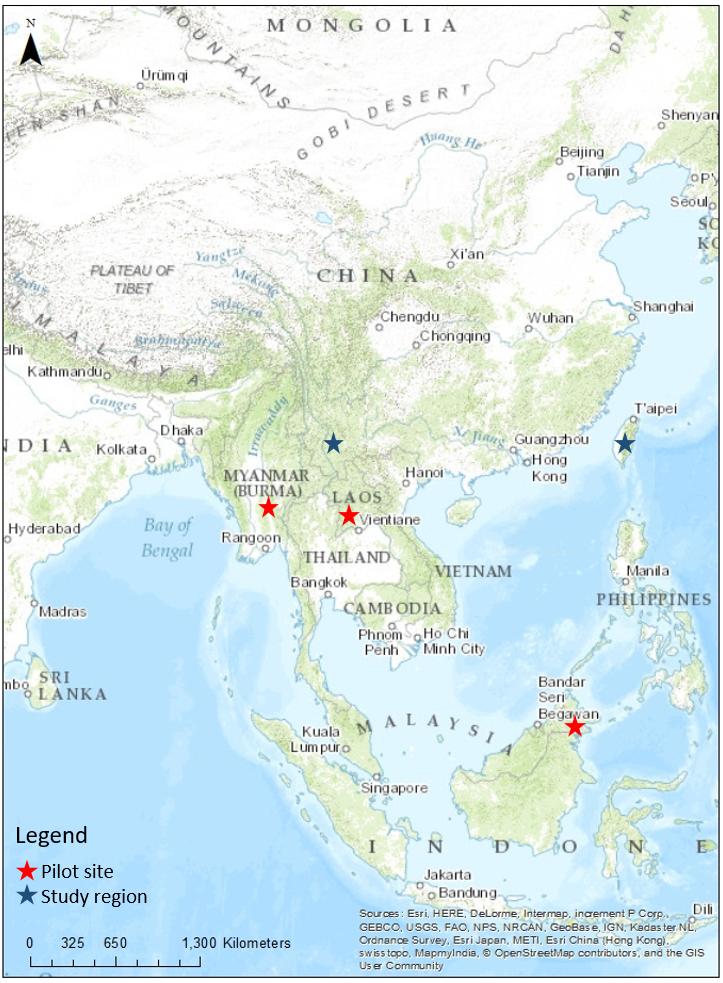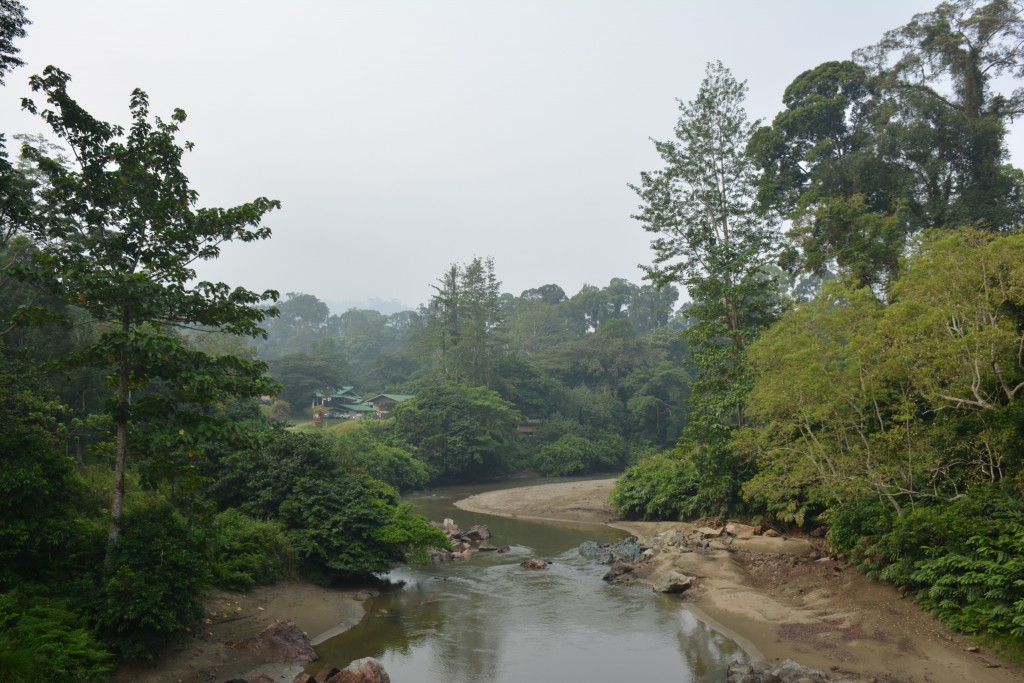Phase II the project will extend the focus to tropical and sub-tropical regions of the Asia-Pacific, specifically Southeast Asia. The research for this phase will be conducted for 3 pilot sites within our partner economies of Malaysia, Myanmar, and Laos and 2 large study areas in China and Chinese Taipei (Figure 1).
Figure 1. The Phase II study area is focused within Southeast Asia. Pilot sites are indicated with red stars and study regions are indicated with blue stars.
Phase II Pilot Sites
Malaysia
The pilot site in Malaysia will include Danum Valley Conservation Area (DVCA) and adjacent disturbed forest. DVCA is located in the southeast corner of the Malaysian state of Sabah on the Island of Borneo and covers 43,800 hectares. The ecosystem at DVCA is a Lowland Dipterocarp forest, with approximately 1,300 species.
Dr. Siti Nurhidayu Abu Bakar and Dr. Mohamed Zakaria Hussin from Universiti Putra Malaysia are the local collaborating partners from the Malaysia. They will work closely with the UBC research team to implement the research done at the pilot site.
The questions we will focus our research on in Malaysia include:
- How might increased frequency and intensity of drought events influence mortality, growth and development in undisturbed and disturbed areas?
- Which species or guilds are most vulnerable?
- How might soil erosion influence productivity?
Crossing over the Sagama River into Danum Valley Conservation Area – Danum Valley Field Centre can be seen in the distance.
Myanmar
The pilot site is located in Toungoo District in Bago Yoma Region in the northwestern part of Kayin state, and covers an area of 1,064,939 ha. The pilot site research will focus on the Yedashe Township within the district. The forest in this pilot site is mixed deciduous made up of dry areas (open forests) and wet areas (closed forest).
Mr. Thaung Naing Oo and Mr. Thein Saung from the Forest Research Institute in the Forest Department within the Ministry of Environmental Conservation and Forestry are the local partners for Myanmar. They will work closely with the UBC research team to implement the research done at the pilot site.
The questions we will focus our research on in Myanmar include:
- What is the expected productivity under the current selection harvest system?
- How might stand attributes associated with ecosystem services (e.g. carbon, volume, other) develop over time?
- How might climate change (increasing drought frequency and intensity) influence long-term productivity and the flow of ecosystem services?
- Should we expect different responses in wet and dry sites?
Laos
The pilot site location in Laos is the research forest associated with the National University of Laos located approximately 70km outside of Vientiane. The pilot site consists of mixed deciduous forest.
Dr. Daovorn Thongphanh and Dr. Sithong Thongmanivong from the National University of Laos are our local partners for this pilot site. They will work closely with the UBC research team to implement the research done at the pilot site.
The questions we will focus our research on in Laos include:
- What is the expected productivity based on long-term plot data (which is yet to be analyzed) in different spacings/mixtures
- How might stand attributes associated with ecosystem services (e.g. carbon, volume, other) develop over time?
- How might climate change (increasing drought frequency and intensity) influence long-term productivity and the flow of ecosystem services?
China
The study site in China will be Yunnan province in its entirety. Yunnan province is located in the Southwest corner of China, bordering Vietnam, Laos, and Myanmar. It covers 39 million ha. The area is variable in its vegetation, weather patterns, and topography, with high elevations in the northwest and low elevations in the southeast. This region is made up of several different forest ecosystems, and has the largest diversity of plant life in China.
Dr. Jainrong Su and Dr. Shuaifeng Li from the Research Institute of Resources Insects, Chinese Academy of Forestry are our local partners for China. They will work closely with the UBC research team to implement the research done at the study site.
Chinese Taipei
The entire island of Chinese Taipei will be used as our study site, with an area of 35,883 km2. The island is divided into two parts: flat, gently rolling plains in the west, and rugged, forest-covered mountains in the east. Natural vegetation in Chinese Taipei ranges from tropical rainforest in the lowlands to temperate forests, boreal forest and alpine plants with increasing altitude. The mountain forests are very diverse, with several endemic tree species.
Dr. Chen Tzu-Ying from National Ilan University and Mr. Huan-Yu Lin from the Taiwan Forestry Research Institute, Council of Agriculture are our local partners for Chinese Taipei. They will work closely with the UBC research team to implement the research done at the study site.


